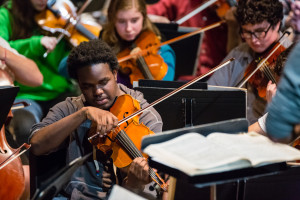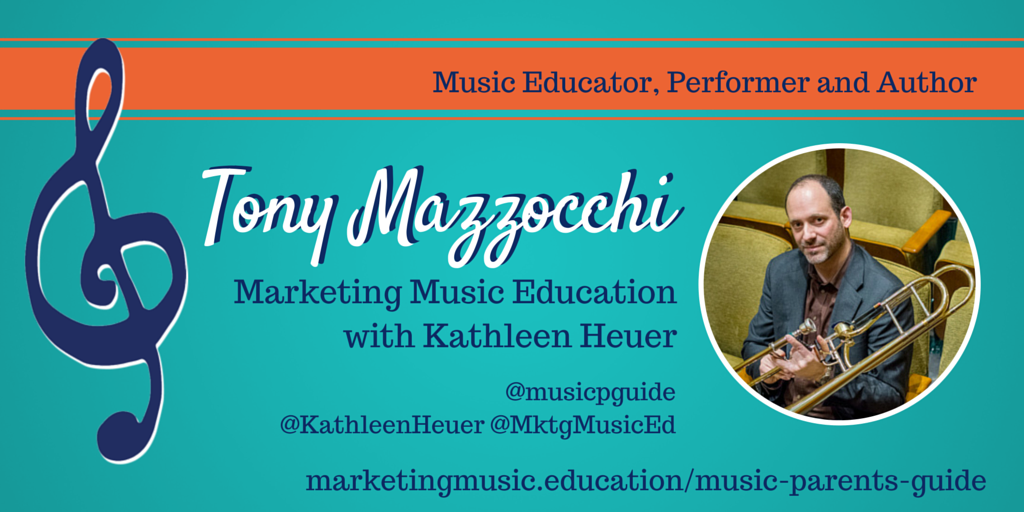 We have learned more about how the brain works in the last decade than ever before. Even with all the new knowledge we have about how children learn, our schools have been slow to adapt accordingly. In my time as a teacher and administrator, I have often been amused to see school leaders and academic teachers scrambling to adjust their delivery of instruction to match what music teachers have been doing all along — engaging all children regardless of ability level and exploiting their natural curiosity.
We have learned more about how the brain works in the last decade than ever before. Even with all the new knowledge we have about how children learn, our schools have been slow to adapt accordingly. In my time as a teacher and administrator, I have often been amused to see school leaders and academic teachers scrambling to adjust their delivery of instruction to match what music teachers have been doing all along — engaging all children regardless of ability level and exploiting their natural curiosity.
By the time instrumental music enters school curricula around the fourth or fifth grade, most students have been divided into “haves” and “have-nots” academically — or, if you will, “smart” kids and kids who need extra help and time on task with test prepping. By middle school, students are aware of their academic “levels” and begin to either engage fully in — or turn off and run away from — their schoolwork.
But instrumental music instruction hits a “reset button” of sorts, and levels the playing field again — everyone starts at “level zero”, and teachers and administrators are often surprised at who ends up thriving in instrumental music. It’s not always the students they considered to be the “smart ones”.
It’s through musical instrument instruction that schools have a beautiful opportunity to share music teachers’ best practices with the academic teachers. Great music instruction teaches habits of the mind that are recipes for success in every other academic endeavor. Here are some of those lessons:
Successful thinking needs to be pleasurable. Children love to solve problems and understand new ideas. We all do, actually. Too often, students spend hours in school (and home) working on problems with no sense that they are making progress. Conversely, knowing an answer to an easy question is not as pleasurable as solving a problem using some mental work. Learning a musical instrument is a process that yields noticeable progress after cognitive work that poses moderate challenge. It has always been this way. Meanwhile, other subject area teachers continue to struggle to make problems interesting and relevant to students to little or no avail. It’s crucial that all students experience successful problem solving experiences in their school day, and music is the best way to deliver these experiences.
Drilling is important, and can be tolerable (even fun!). It’s almost impossible to be proficient at something without repetitive practice. Unfortunately for academic teachers, drilling facts can kill students’ motivation and sense of fun very quickly. Through musical instrument instruction, students easily learn that practice enables further learning, and band/orchestra/choral directors find that drilling sections of music works wonders — students are rewarded with better technique, sound and ensemble immediately, and they have fun accomplishing it. Students who learn what, how and when to practice through music have a great opportunity to transfer these skills to their other subjects.
Intelligence and talent can be changed through sustained hard work. School leveling inadvertently promotes a fixed mindset to students — lower leveled students end up believing that intelligence is not malleable, and they become stuck in their levels. Of course students differ in intelligence, but that should not mean the students who have difficulty keeping up are out of luck. If schools only had academics all day with no art or music, can you imagine how many defeated students we would have in this world? Music is a place for students to thrive who may not be as successful in other subjects. Music teachers have the ability to arm students with a growth mindset while praising effort and not ability and treating failure as a natural part of learning.
Music teaches students to understand how experts create. Historians don’t spend all day memorizing facts and reading textbooks, but we teach that way in school. Scientists conduct experiments to find out what will happen, and then they interpret the results; they do not know the result of the experiment in advance, which is the way we teach the subject in school. Professional musicians, however, practice and fail the same as anyone else who is just learning. Practice is the only way to become an expert, and sustained work is the singular most determining factor of success in any field. Music teachers engage students on the same journey of self-improvement as all the great masters have embarked on. In the same way we teach students how to be great at music, schools would be wise to provide children with real-world understanding of how experts pursue their crafts and teach their subjects accordingly. Of course, this would be easier to do without so many high stakes tests to prepare for…
Instrumental music instruction has the potential to teach students, parents, teachers and school leaders the truth about what keeps students engaged and liking school — everyone needs to pay attention. Teachers must keep children interested by knowing their students — what they are capable of doing and what is just beyond that; how to get them to practice without boredom; and how to change their mindset from fixed to growth.
It is clear that not enough kids like school as evidenced by high school drop-out and college completion rates. Schools defeat themselves by giving all students the same work to complete. Our brains have a bias to mentally walk away from schoolwork, and most students do just that when the work is not differentiated and modified just for them. Music fits this bill perfectly: instrument choice, skill-appropriate repertoire, part assignments, and ensemble placements allow music teachers to assign work to individuals or groups of students that is appropriate to their current level of competence. Students learn what it’s like to practice like an expert and create beautiful, tangible (and intangible) results in the process.
Quality music education motivates people to learn, and schools must provide access to it in order for students to begin to like school again. Music is one of the few subjects that keeps students who hate school willing to even show up each day and participate.
School leaders, take note…
The Music Parents’ Guide : A Survival Kit for the New Music Parent is available in paperback and on Kindle on Amazon! If you are an educator, please let your parents and students know about this resource in order to help them through their initial years of study and beyond! If you are a parent, please consider purchasing and letting your school music teacher know about the book and this blog. Thank you!








Brilliant post – thank you, Tony! One thing missing from this article and from music education curricula: music education needs to encourage and train more actual music _creation_, not just re-creation of what a distant expert (composer/arranger) has created for the student. Jazz is great, but it’s not for every instrument or student. The good news is that there are plenty of ways for students to create their own music (along with playing in band or orchestra or singing in choir) – but creative music needs a place in the curriculum along with re-creative music. Art students paint and make sculpture. English students write poems and essays. Theater students learn improv. But too much of music education too much of the time is a creative art without much creativity. Students graduate with music doctorates without ever having improvised or composed their own music. Doing music has great benefits for the student and for society – but it is only half of what’s possible. Giving students a musical voice and letting them express themselves is the other half of music, musicianship, and motivation.
Jeffrey Agrell recently posted…Chris Johnston on Performance and Improvisation (Quote)
It’s true, Jeffrey — there is another layer to creativity once we attempt to introduce it in the slightest way to the school system. It’s really evidence of how far we need to travel…